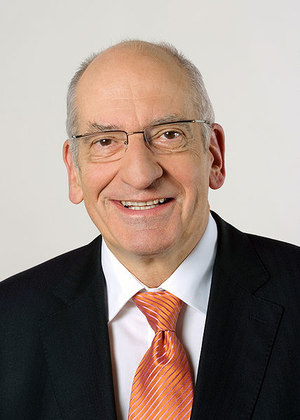
Unternavigation
Pascal Couchepin
As an exponent of Swiss liberalism, federal councillor Couchepin particularly shaped political debate on old age insurance.Although he did not see the conclusion of the eleventh AHV revision during his tenure, he played a critical role in implementing reforms to disability insurance and health policy.
Pascal Couchepin was born in Martigny on 5th April 1942. He grew up in a traditionally liberal family, despite his home canton of Valais being a strong hold of the Catholic CVP. His family environment was characterised by a distinct interest in politics. After taking his high school leaving examination at St. Maurice College and subsequently completing his law degree at the University of Lausanne in 1966, he gained a notary diploma and passed the bar examination in 1968. Like his father and grandfather, he became actively committed to the interests of business, since he believed progress was only assured through the development of industry and tourism. In interviews, he kept expressing a keen interest for the common good.
In 1968, Couchepin was elected to the executive authority of Martigny and served as its Mayor from 1984 to 1998. He became a national councillor in 1979 and the floor leader of the FDP delegation at the Federal Assembly in 1996. Before he was elected to the Federal Council, he was a member of various boards, presided the Swiss Multiple Sclerosis Society and a number of organisations dedicated to the interests of people with disabilities. After his election to the Federal Council in 1998, he became the head of the Federal Department of Economic Affairs as well as the head of the Federal Department of Home Affairs in 2003 until he stepped down in 2009.
In social policy, Couchepin pressed ahead with the eleventh AHV revision initiated by the social democratic federal councillor Ruth Dreifuss. In 2003, he presented his strategy for the future of AHV to the Federal Council that included an increase of the retirement age to 67 years. The proposal caused quite a stir. According to his final draft presented to the Federal Council women’s retirement age was to be increased from 64 to 65 years and widow’s pensions to be aligned with widower’s pensions, which were lower. In 2004, the eleventh AHV revision and the increase in value added tax for the benefit of the AHV and the IV failed at the ballot, mainly due to the rallying of women and the left wing. In 2006 and 2009, Pascal Couchepin, aiming to cut costs in the pension system, pushed for a reduction in the conversion rate for pensions disbursed by occupational provision (second pillar).
In 2007, Couchepin opposed the left wing initiative ‘For a social, national health fund’ which was defeated by referendum. During his tenure, the Health Insurance Act underwent several changes shaped by liberal ideas: the share of costs borne by policyholders was increased, a new, flat-rate based hospital funding model was introduced and public and private nursing facilities were brought in alignment. As a federal councillor, he also supported cancelling compulsory contracts for health funds in order to increase competition between service providers, a policy demand raised by the health insurance lobby (Santésuisse). Pascal Couchepin was also committed to maintaining non-income related per capita premiums as a means of promoting the personal responsibility of policyholders. Additionally, Couchepin advocated the fourth and fifth IV revisions (2004 and 2007), both of which contained reductions in benefits and focused on re-integration into the labour market. In family policy, he was responsible for implementing federal maternity leave (2004) and the Federal Act on Family Allowances (2006).
Literatur / Bibliographie / Bibliografia / References: Hoesli Eric (Interview mit) (2010), Pascal Couchepin, Bundesrat fédéral, Plans Fixes (Videoaufnahme), Martigny; Couchepin Pascal (2002), Je crois à l’action politique, Entretien avec Jean Romain, Lausanne; Bilanz von Bundesrat Pascal Couchepin im Eidgenössischen Departement des Innern (2003-2009), http://www.edi.admin.ch/org/01543/01904/05050/index.html?lang=de, Bern, 2009.
(12/2014)




